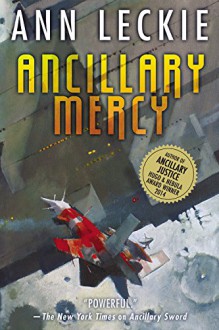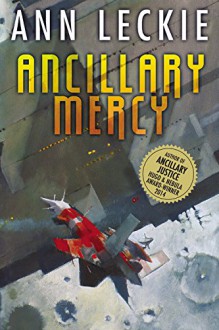
Ancillary Mercy is the third book in Ann Leckie’s stunning Imperial Radch trilogy, and it’s a perfect end to Breq’s story in tone, resonance, and emotional payoff. These books have been some of my absolute favorites from the past few years, and I will be reading anything Leckie publishes from now on. The rest of this post will be a somewhat spoilery fan letter to the series, and the third book in particular.
After Ancillary Justice, I was a bit worried that maybe the next book would be a let down from the first. Instead, in Ancillary Sword, Leckie wrote a story that was even more thoughtful and emotional. And then she did it again, with Ancillary Mercy. I’m curious about her process–was this trilogy planned all the way through? Because it feels like there is a very clear arc to the books and that there’s a sense of payoff that you earn as you read the series. This is the kind of trilogy that builds on itself, until a whole host of emotional resonance and response can be compressed into one line and the reader knows exactly what is not being said. (This reminded me quite a bit of The King of Attolia, for my fellow MWT fans.)
Most of all, for me, this book was about the fulfillment of Breq’s arc. At one point, she says, “But it wasn’t just me anymore,” which for me summed up so much about her journey. If Ancillary Justice is the story of revenge, with an unwilling sidekick in Seivarden, and if Ancillary Sword widens the world and establishes Breq’s connections to Athoek Station and Mercy of Kalr, then Ancillary Mercy widens the world and the relationships even further, to the Presger and to the Station and [spoiler but think Ghost Gate]. “But it wasn’t just me anymore,” meaning both that Breq is part of a community and that she can no longer simply act independently. If you care about the fate of others and know that your actions will change them, you don’t proceed in the same way.
And if we look at Breq’s identity, there’s a similar arc. This is a story about both finding and creating community and family (there’s an exchange late in the book that really cemented this for me) and how Breq sees herself is integrally related to this. In Ancillary Justice, Breq defines herself almost entirely by lack: who she is not (Justice of Toren), who she does not have (Lieutenant Awn). In Ancillary Sword, we see her begin to be defined by who she is, and who she does have. Ancillary Mercy sees that come full circle, as she begins to take up who she is, in her entirety. Which means that she while she is not Justice of Toren, she’s also not human either. While she does not have Lieutenant Awn, she does have this unlikely group of which she is, perhaps, the pivot point.
Ancillary Mercy is also a wonderful combination of heart-breaking emotional moments (I said on Twitter that reading it was like being punched repeatedly in the feels and liking it) and really funny moments. There’s one scene, with Breq and two others, that is such a perfect mix of absolutely hilarious and absolutely heartwrenching (peep peep peep peep!). It made me cry a lot, but it also made me smile and laugh out loud. These are books that maybe shouldn’t feel like comfort reads, but they do.
Finally, I have a lot of love for the resolution and ending. I’ve seen complaints that the series doesn’t go far enough in toppling the Radch system, and yet I think that is entirely the point. This is not a book/series about revolution; it is a book/series about living within and reacting to a system, against fighting against it while also recognizing that you are part of it. It’s deliberately intimate and personal, while also being aware of how personal choices have wider consequences. It’s not a book about grand gestures; it’s a book about taking a step, and the next step.
________________________________
My review of Ancillary Justice; my review of Ancillary Sword
Other reviews of Ancillary Mercy: Liz Bourke; Genevieve Valentine for NPR; The Book Smugglers; Kam Martinez

 Log in with Facebook
Log in with Facebook 


















